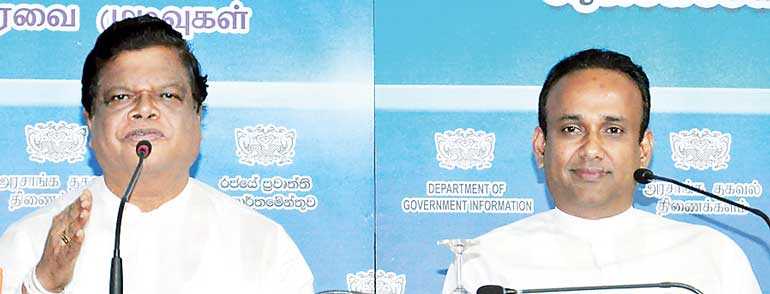Tuesday Feb 17, 2026
Tuesday Feb 17, 2026
Thursday, 28 November 2019 03:42 - - {{hitsCtrl.values.hits}}

Newly appointed Cabinet spokesmen Ministers Bandula Gunawardena (left) and Ramesh Pathirana speaking to reporters yesterday – Pic by Sameera Wijesinghe
Extensive stimulus package approved at first Cabinet meeting
VAT reduced from 15% to 8%
Numerous other taxes abolished or changed
Support for banking, financial services, insurance, tourism, tech, and more
One Cabinet paper has as much relief as an entire Budget, says new Cabinet spokesman
More relief for agri and plantations in the offing
By Uditha Jayasinghe
The first Cabinet meeting presided over by President Gotabaya Rajapaksa yesterday approved an extensive stimulus package mostly centred on slashing Value Added Tax (VAT) to 8% from 15%, to give relief to major sectors and boost much-needed economic growth.
Newly-appointed Cabinet spokesmen Ministers Bandula Gunawardena and Ramesh Pathirana told reporters that the tax reduction package would come into effect from 1 December, with Gazettes to be rolled out by Prime Minister Mahinda Rajapaksa, who is also the Finance Minister. Parliamentary approval is expected to be sought later. “This one Cabinet paper has given as much relief as an entire Budget,” Information and Communications Technology, Higher Education, Technology and Innovations and Media Minister Bandula Gunawardena said. “This is the first of many victories for the public.” In addition to the decision to replace 15% VAT and 2% Nation Building Tax (NBT) on goods and services with one all-encompassing VAT of 8% from 1 December, the Cabinet paper also ensured that it delivered on many of the tax reductions promised in President Rajapaksa’s election manifesto.
Tax-free threshold turnover for VAT will be raised from Rs. 1 million to Rs. 25 million or Rs. 300 million per annum to give immediate relief, particularly to small and medium businesses in all sectors, the spokesmen said.
Tourism business will be treated as export for zero rate provided that 60% of turnover is sourced from local suppliers. The Cabinet paper also pointed out the tourism industry will be beneficial to local agriculture and locally-made manufacturing businesses.
The Economic Service Charge, Debit Tax on banking of financial institutions, capital gains tax on stock market transactions, and VAT on condominium property have all been removed. The Telecommunications Levy has also been reduced by 25%, while foreign currency earnings have been exempted from income tax. VAT on banking, financial services and insurance to be maintained at 15% and NBT removed. Taxes imposed on religious institutions and charities also removed. The construction industry will be under 14% income tax, instead of the existing 28%, and Pay As You Earn (PAYE) taxes to be removed for earning on all inclusive monthly income of Rs. 250,000 instead of the current ceiling of Rs. 125,000 per month for all public and private sector employees, with effect from 1 January 2020. Withholding Tax on interest income removed for those with monthly interest income less than Rs. 250,000.
“Importation of tea, pepper, raw rubber, cinnamon, and many agricultural commodities and other locally-made small industrial products will be safeguarded from import competition. Accordingly, I recommend such items to either be placed on negative list or subject to very high custom-based taxes,” said the Cabinet paper, seen by Daily FT. Farm income from agriculture, fishing and livestock is also to be made tax-free.
“Items which are not manufactured in any form and also beneficial for the country to have access to global resources will be made duty-free. Machinery and equipment which are not made in Sri Lanka along with advanced technology too will be made duty-free. Preferential rates under various Trade Agreements will be reviewed. Standard Customs Duty rate on items other than those specified will be maintained at 15%,” the Cabinet paper added.
Gunawardena insisted that despite the stimulus package, expected to run into billions of rupees, the Rajapaksa administration was relying on three things to bridge the revenue shortfall.
“We believe these measures will jump-start an economy that has been long-stalled and under-performing. Once growth starts, we will see government revenues increase. Instead of the policy of charging high taxes from a few, which was what was done earlier, we will now see taxes flowing in from more businesses and individuals. These policy changes will widen the tax base and raise public revenue,” he insisted.
The other two options were increasing investment to Sri Lanka, and trimming public expenditure, both of which Gunawardena said would be focus areas of the Government.
“Safeguarding key agriculture crops will be an aspect that we hope to focus on very soon. We understand that there are many thousands of farmers suffering because of issues in these sectors. We will introduce restrictions on agriculture imports and ensure local farmers get better earnings,” said Plantations and Export Agriculture Minister Ramesh Pathirana.
